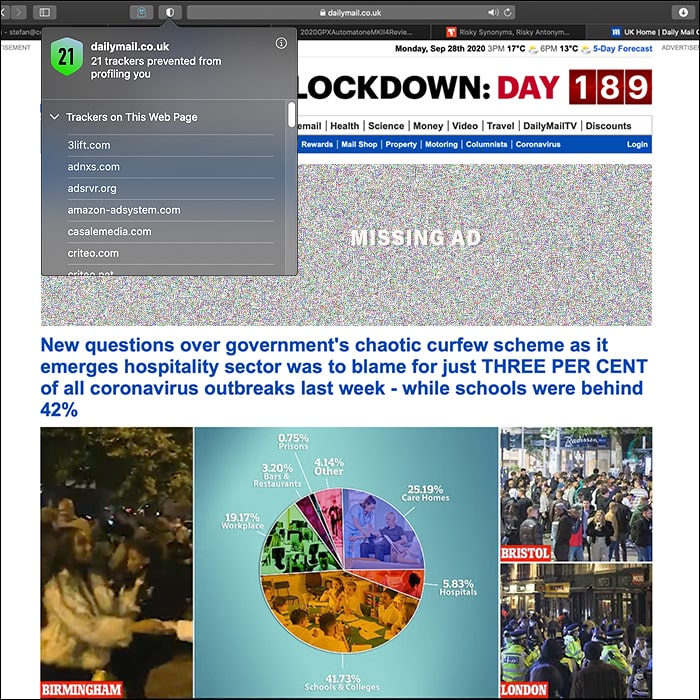Organisations and Businesses need to be on the lookout for misleading GDPR-Violating and SimilarWeb (and equivalent) Website Traffic Comparisons

Since the onset of GDPR and equally fairly recent browser privacy changes where tracking requires user consent, the bottom has sort of fallen out of the 3rd Party Cookie Stats Tracking Apps as roughly only 1 in 5 users are currently consenting to be tracked. And even dramatically with Apple’s new option to opt out of 3rd party tracking in all its apps in iOS 14.5 - with around 95% of users having opted out.
We know from our own fully incorporated Affino native site tracking and analytics just how far those traditional Web Stats Apps - like Google Analytics - are currently out of sync with the reality of the actual true traffic figures, and are regularly seeing 50% fewer impressions in Google Analytics on Affino sites versus Affino’s native stats which are 100% 1st party.
SimilarWeb is Not an Accurate Reference
SimilarWeb works on the basis that organisations share like for like Google Analytics with them, and on that basis they provide a definitive statement on relative traffic levels. This falls down immediately in the event where there are two organisations, only one, or indeed neither of which provides their fully representative statistical data to SimilarWeb. At that point the comparison should have big flags to highlight that the comparison is entirely speculative.
While this is not how it goes down currently - as there is no indication given that the comparisons are entirely speculative and should not be used in any way beyond a very rough guidance.
Companies are Violating GDPR to Drive their Sales Pitch
The second big challenge here is that many companies are still not fully GDPR compliant, and have not set up their website (and broader tracking) to be GDPR compliant. One of the cornerstones of GDPR is to not be personally tracked. That is users have to opt in to be tracked individually.
We see throughout the web that Google Analytics cookies are being dropped on users’ browsers without them ever accepting them. This is a clear violation of GDPR, as the users should by law first need to accept being tracked prior to those cookies being dropped.
This means that sites which are GDPR compliant might naturally see an 80% drop in Google Analytics tracked traffic versus those who are not. Undertaking this action is highly questionable, including deploying ’legitimate interest’ exceptions. And then going on to use those potentially illegally obtained statistics against GDPR compliant competitors is underhanded at a minimum, and clearly unethical.
The ICO has been woefully inadequate in policing GDPR - and as a result several (likely the majority of) businesses are cheating GDPR and getting away with it - while honest companies and organisations who comply with GDPR are always going to have smaller data sets as those are honestly and lawfully acquired.
Market Education is Key
Some of our customers have suffered by being wrongly and unfairly misrepresented by some of those Stats companies and where GDPR-compliant data sets will always be smaller than unpermissioed data - and where in reality those two wholly differently acquired data sets are totally at odds and cannot and should not be compared.
Educating the market on this is relatively easy. They can go in on their browser and immediately see if a company is automatically dropping Google Analytics (or similar cookies) or not. They can also go to SimilarWeb and see how to be included in the stats, and to see how their own brands are being represented there.
Those more fair-play organisation really need to form an alliance to fight the misrepresentation that is going on - as inevitably where some are getting away with it - other less scrupulous organisations will likely follow suit.
Surely the time of spurious third party data has long since past its sell-by-date and more need to switch to more honest First Party Data gathering, permissioning and validation.

Did you find this content useful?
Thank you for your input
Thank you for your feedback
Upcoming and Former Events
Affino Innovation Briefing 2024
Webinar - Introduction to Affino's Expert AI Solutions - Session #2
Webinar - Introduction to Affino's Expert AI Solutions - Session #1
PPA Independent Publisher Conference and Awards 2023
Meetings:
Google Meet and Zoom
Venue:
Soho House, Soho Works +
Registered Office:
55 Bathurst Mews
London, UK
W2 2SB
© Affino 2024































